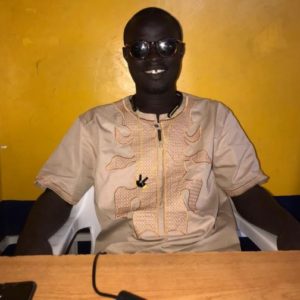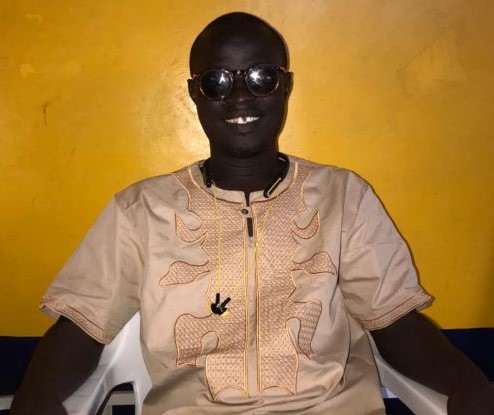PHOTO: Rev. Z. Wilfred Gewon in his office at AME University (Image used with permission)
By Elbie Selbeh
In various street corners in Monrovia and other parts of Liberia, persons with disabilities are often seen begging for handouts just to eke out a living.
Some walk far distances daily to achieve their quest for handouts– a condition causing many to see them as an object of pity.
But there are many cases, where people living with disabilities have raised by their fellow PwDs and have become role models by their level of advancement in education and the business and other entrepreneurial skills they have acquired, thus making positive impacts in the Liberian society today.
Rev. Z. Wilfred Gewon is one such person who has fortunately been able to beat the odds, rise to the occasion and compete with able bodied people in the academic world.
He is a visually impaired professor who is managing the Lions Club’s computer Institute for the blind being housed at the African Methodist Episcopal (AME) University located on Camp Johnson Road in Monrovia.
Rev. Gewon has not allowed himself to be treated like an object of pity, but a person who can compete with people who are not disabled and positively contribute in his own way, thus ensuring that fellow PwDs are educated like him.
A graduate of the AME University with a degree in Public Administration and Bachelor of Theology, Rev. Gewon has distinguished himself in this institution of higher learning by adding a diploma in Monitoring and Evaluation to his credentials, after completing an intensive diploma program.
In a recent interview with this Reporter in Monrovia, this visually impaired college professor explained that after his secondary school, he had the opportunity to teach reading and writing with crayon on the chalk board- a learning process that made sighted people to wonder.
How Rev. Gewon obtained computer skills
Things eventually changed from manual reading and writing with crayon on the chalk board for the better for him and those he was helping, when he got an opportunity to travel to South Africa in an attempt to advance his education.
In that country, Rev. Gewon attended the Ultimun College, an institution he obtained computer science engineering and networking skills in 2013.
After receiving the computer knowledge in South Africa, he decided to give back to society.
“In 2014, I organized the first and only computer school for the blind where we started with one computer,” he said.
Now to date, Gewon’s computer program has successfully graduated 36 persons with sight impairments.
Now to date, his program has directly impacted 23 males and 13 females over the past 6 years in computer science.
Additionally, Rev. Gewon said from starting with only one computer, he currently has a computer lab of 10 computers at the Lions Club which are disabled user friendly.
Through the computer training for the blind, he and one of his visually impaired colleagues- Jeff Tarnue had the opportunity in 2017 to receive another award from the American Embassy to travel to South Africa again, but this time for an advanced brush out technology training sponsored by UNDP.
Upon his return, he was given a contract by the American embassy to train his fellow visually impaired colleagues.
Other skills of the visually impaired Computer Lecturer
He is not only good at computers, but this Methodist Pastor is also good at barbing.
He has proven to be the first and only visually impaired person to obtain an award in barbing in Liberia.
Rev. Gewon got the title after he was trained in South Africa to barb.
He explained that he learned this skill by means of feeling and he has been very good at it for some time now.
“There are lots of things we as humans can learn through our feelings. It’s not by our sight the only means of doing things,” he said.
This multi-talented visually impaired Liberian man is one of the only persons who have the ability to cut hair any time of the day or night!
Article 27 of the Convention on the Rights of Persons with Disabilities speaks about work and employment saying that states parties shall recognize the right of persons with disabilities to work, on an equal basis with others.
This international convention goes on to say that, “This includes the right to the opportunity to gain a living by work freely chosen or accepted in a labour market and work environment that is open, inclusive and accessible to persons with disabilities.”
The convention adds: ” States Parties shall safeguard and promote the realization of the right to work, including for those who acquire a disability during the course of employment, by taking appropriate steps, including through legislation, to, inter alia.”
It is in this direction that the Liberian government established the National Commission on Disability (NCD).
Section 5 of the NCD Act states that for every hundred non-disabled employees, four percent must be qualified PWDs who are gainfully employed or funds are provided for their employment elsewhere.
There are conversations to have those with disabilities included in the workforce of the Country, wishing to achieve a 4% of them employed.
Ricardia Dennis, the Director of the National Commission on Disabilities, says her group has been making efforts to help persons with disabilities not because they are disabled, but because of what they are capable of doing.
“I know many of you will not agree with me but even though the law states that out of 100 persons there should be 4person with disabilities employ into offices but it’s only the competent ones will have the opportunity, jobs for PwD won’t be base on Sympathy,” Madam Dennis said at a recent gathering of persons with disabilities in Monrovia.
How did Rev. Gewon become visually impaired?
Rev. Z. Wilfred Gewon was born without sight problem, but became blind during one of Liberia’s greatest battles during the country’s civil war–the April 6, 1996 Monrovia fighting.
At that time, he was a 6th grade student at the Gray D. Allison School located at the BTC Military Barracks in Monrovia.
He explained that it started with a gradual pain he experienced for some time, which intensified later in his right eyes- a situation which resulted to him go on many nights without sleep.
In trying to find a solution to his situation at that time, his parents gave him lots of pain killers (tablets), but it was no help to his aching eye.
After trying on the own, his dad later took him to the hospital for testing. The test result showed that his eye had developed growth within it and there was a major surgery needed to be done.
The amount needed to do the surgery was US$700.00 and his, his father had to sell some of their properties in order to raise the money for the surgery. But unfortunately, the surgery was not successful and his right eye got damaged in 1997.
After four years (1997-2001), his left eye also got affected and that’s how he became visually impaired.
Beneficiaries speak on Lions Computer training impacts
Rev. Gewon has made tremendous impact on many lives through the Lions Computer training program at the AME University, as this Reporter was told by some of those who graduated from the program over the years.
Frederick S. Jay, a 2018 graduate of the institution said it was because of the training he acquired from the school, that he is today able to work in various computers software and he understands the internet.
Mr. Jay had words of praise for Rev. Gewon for seriously impacting his life.
“Before attending Rev. Gewon’ school, I had absolutely no idea about computer,” Jay said.
Natasha Musuleng Jackson is another beneficiary who graduated in 2017 from the computer training institution.
She said the kind of knowledge she acquired from Rev. Gewon’s institute capacities enough to demonstrate the ideas anywhere to help educate anybody who is willing to learn from her.
“I’m fully capacitated and I can prove it anywhere” Ms. Jackson said.
Many people have allowed their disabilities to consume them, leaving them with no other option but to take to the streets for handouts.
But Rev. Gewon is encouraging his fellow PwDs to do the opposite and not allow their conditions to set them back in life.

“Do not see your disabilities as your inability,” he advised. He said what he does at all times is to exert himself above his condition, something points out has paid off for him over the years.
Rev. Gewon has therefore encouraged persons with disabilities to see themselves as those who can change lives of others and not liabilities to society. Publication of this article was made possible with support from Internews Inclusive Media project

